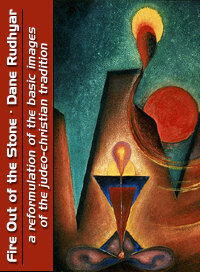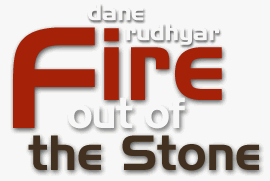 |
| Home | Bio | Art | Music | Literature | Civilization & Culture | Philosophy of Wholeness | Theosophy & Spirituality | Astrology |

FIRE OUT OF THE STONE A Reformulation of the Basic Images of the Judeo-Christian Tradition by Dane Rudhyar, 1962 1. Not to Repeat, But to Renew • Page 1 • Page 2 • Page 3 2. The Essence and the Substance 3. To Become "More-Than-Man" 4. The Fatherhood of God 5. At the Center is Soul 6. Creation and Evolution 7. Crisis and Sin 8. The Coming-Together of God and Man 9. Christ-Love: The Covenant with Individual 10. The Life of Mediation and its Paradox
: : :
This title was first published by Sevire, 1963. Cover for the online edition copyright © 2008 by Michael R. Meyer. : : : : : :
"Thy God is a cosumming fire." Duet. 4:25 "He shall baptize you with the Holy Spirit and with fire." Matthew 3:11 "I am come to send fire on the earth." Luke 12:49
: : :
|

1. NOT TO REPEAT, BUT TO RENEW - page 1"And be not conformed to this world, but be ye transformed by the renewing of your mind"
Romans 12:2 "Only the self that is willing to dare change can think creatively" Charles Morris — The Open Self Three facts dominate the world-situation today. The first of these is that the very spirit and character of our Western society and our purportedly "Christian" civilization have been and are being challenged. They are challenged in an obvious and relentless manner by the impact of the Communist ideology and the actual expansion of the Soviet-dominated nations. They are likewise challenged by all forms of economic and scientific materialism in our own country, by the enormous spread of crime, insanity, sickness, collective hysteria, political corruption, juvenile delinquency — and as well by subtler dangers which are the very shadow of our democratic inheritance and our emphasis upon production-at-all-costs, physical wealth and technology as a cure-all. The second fact is that in Asia, Africa and throughout the Americas, the rising tide of so-called colored peoples is beating against the citadel of the white and Christian attitude of superiority, challenging us to show proof that we have a valid and vital claim to world-leadership and that our conquest, oppression and often enslavement of these peoples was justified, at least in the long run, by the great value and significance of what we brought to them in the conquest. The third fact is that the Western Christian world has shown no convincing ability and very little readiness to meet these two challenges, the most crucial ones which have confronted us since the spread of Islam in the seventh century and the Mogul invasions in the thirteenth. We have fought back, when attacked by Communism in Korea, on a side-issue which an imaginative as well as realistic diplomacy might have solved. Suddenly aware of military weakness, we have rushed into rearmament. Our productive capacity and economic power, our engineering skill and our large reservoir of trained manpower may prove sufficient to cope in time with the military aspect of the Communist challenge. But it is only one aspect of the challenge. It leaves the far more basic and widespread challenge to the Christian civilization and way of life unanswered. It could even assist the forces which, from within the United States, are eating up the foundations of this civilization and this way of life. It places American generals and admirals at the head of joint Western forces; but does it make Christ and Christian values more real and more dynamic, in a way directed toward the solution of the vast human problems of today — more real to European peoples as well as to Hindus and the Chinese masses; more real to us, Americans? It is customary for the U.S. to win wars. But what of the peace which follows? One can win a war by production and military might; but to win a peace another kind of power is necessary: the power of spiritual directives and effective purpose, the power generated by faith, vision, understanding and the inclusiveness of love. To win the peace is to win the hearts and the respect of men. It is to exemplify in one's behavior the essential values and ideals for which one consciously and purposefully stands, for which one fought. It is to be secure in self, because one is established in God — if one believes in God, as we say we do. Today moral and spiritual insecurity are rampant in prosperous and immensely productive America. This is no doubt the main reason for the much publicized "return to religion", both in the case of a group of "intellectuals" and in that of the "common man"; but it is also the cause of ever-spreading alcoholism and schizophrenia, of stomach ulcers and the widespread use of barbiturates and tranquilizers. This moral and spiritual insecurity has developed a powerful psychosomatic impact. It leads to corruption and sex-crimes, to dope and brutality. There is much collective sickness in America and all over the Western world. There is a desperate need for healing — not merely of body, but far more of psyche, soul or mind. Thus many turn to God. They ask of Christ, the Divine Healer, a total cure, deliverance from totalitarian evil. They return eagerly, searchingly, to the church of their earlier days to find the way to Christ. Will they find it there? Are the Christian Churches able and ready to heal the sickness of Western society by the power of the spirit and truly "in the Name" of Christ? Are they able and ready to assume leadership in meeting the challenges with which the Christian civilization is faced, from within as well as from without? Are they able and ready to make Christ real today, for humanity as it is today — real as the savior, healer and leader of modern man plagued with the ills, the conflicts, the fears, the problems which are his today? If they are, the proofs are neither evident nor convincing. We have for centuries taken Christ and the inherent superiority of Christian ideals for granted. When the power of the Churches began to wane after the eighteenth century we transferred some of our pride to our democratic institutions, and more recently to "science" and to technological marvels. The superiority of these we have also been taking for granted; and for a while no one questioned our self-glorification. But now we have been put on the defensive. Christianity, which in the first centuries was able successfully to challenge the Roman Empire, is now the one to be challenged. Christianity is on the defensive as well as democracy, notwithstanding the apparent revival of religion and the spread of American influence. We can no longer take our superiority for granted in self-complacency, because no one else takes it for granted. We can no longer claim, as a matter of evidence, a privileged world-position as leaders of humanity, because in the eyes of those who challenge us to prove our claims, the validity of these claims rests almost entirely upon our enormous material productivity, wealth and engineering skill; and these are not enough. They are not enough for enduring leadership in the modern world rent by conflicting ideologies. People in Asia, and even in Europe and Latin America, often desperately need food, tools and primary comforts; but they need more. The issue is: Can we provide this "more"? Can we assume a leadership in ideas, a spiritual leadership? We must do it if we are not to fall, like the Roman Empire of old, into the hands of liberated slaves and "strange gods" from the vast expanse of the Mother of religions, Asia; if Christianity is not gradually to vanish, as did the religions of the Mediterranean world which once it absorbed and supplanted. The challenge we must meet goes far deeper than to be merely "good Christians" in the usual taken-for-granted manner. What one takes for granted, that one loses spiritually. One does not create a new world, a new society, with values taken for granted; with images, idols, or ideas worn thin and pale by familiarity and an unquestioning, unthinking sense of superiority. One does not thus create a new world; but we are challenged to create a new world, or at least to try, and to lead in the attempt. Are we really trying? Are we really trying when we wend our way back to the old churches of our childhood where preachers tell the familiar stories, perhaps with great skill and oratory, perhaps in the genuine belief that if all the churches are full our nation and Western civilization will be saved? But this belief does not make of us leaders in the name of Christ, and creators of a new society! The revival of old forms is not creation. Creative leadership is a dynamic process of projection of values. These values must have the freshness and mystery of a superconscious, God-inspired, spirit-releasing origin if they are to arouse and impel to action. They must be of the now. They must be warm with the feel and immediacy of personal experience if they are to convince and to transform — far more than merely to "reform". No one can be a spiritual leader who has not personally experienced the spirit, however faintly. Indeed in this day of challenge and wholesale denial of spiritual values, no one can be truly and dynamically a Christian leader who has not experienced in some measure the reality of the Christ. One need not here take too literally the term experience. It is not essentially a matter of "having a vision" or "hearing a voice". What is meant is an intimate, direct, personal and transforming realization of what is actually and creatively at the core of those values and ideals which we consider basic in Christianity and in our Western civilization. In this realization thought and feeling are blended, and in their union they polarize some still higher faculty — some power that seems to "come down" into us, that illumines us and arouses in us a cool fire, a serene enthusiasm, a conscious individual will. Because this power has been so little experienced and because our conventional approach to the spirit, to God and Christ has made most minds rigid and easily frightened by any power which seems revolutionizing, Christianity has largely failed to provide men and women with the capacity for true spiritual leadership.  Home | About | Calendar | Ephemeris Charts | Art Gallery | Library | Resources Shop | Rudhyar Archival Project | Help Web design and all data, text and graphics appearing on this site are protected by US and International Copyright and are not to be reproduced, distributed, circulated, offered for sale, or given away, in any form, by any means, electronic or conventional. See Notices for full copyright statement and conditions of use. Web design copyright © 2000-2004 by Michael R. Meyer. All Rights Reserved. |